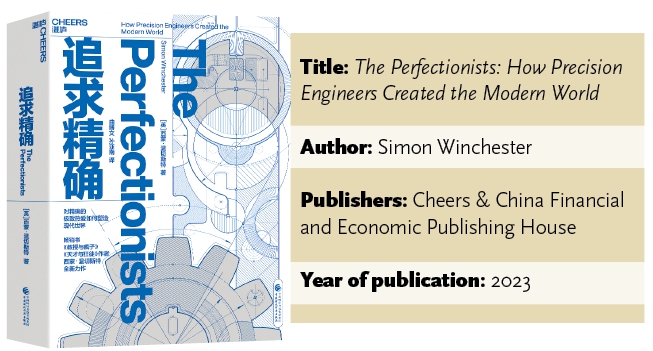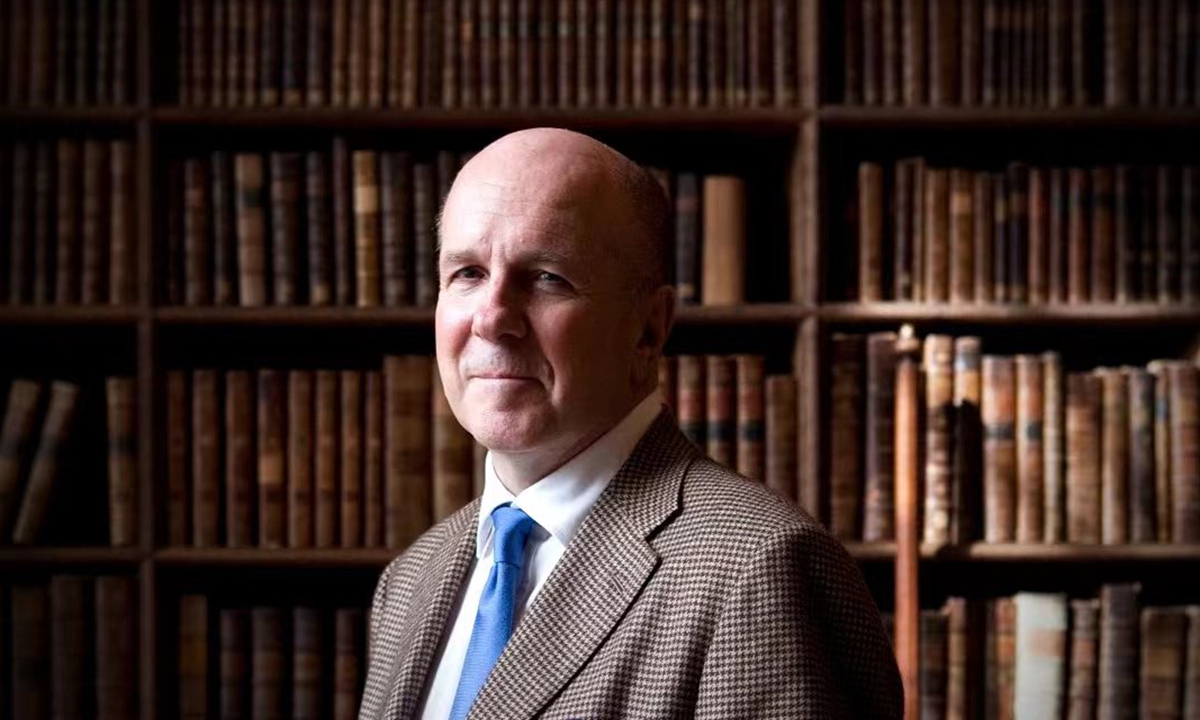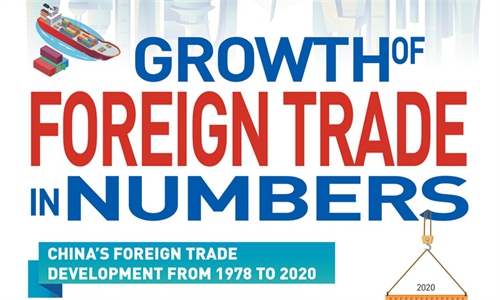ARTS / CULTURE & LEISURE
From historical culture to mechanical prowess, British author captures China’s growth in his new book

In a recent trip to China to launch the latest Chinese version of his book, The Perfectionists: How Precision Engineers Created the Modern World, British bestselling author, historian and journalist Simon Winchester applauded the largely unsung crop of Chinese engineers and IT technicians who are responsible for the creation of innovative and intricate machines, after conducting in-person visits to Chinese manufacturing lines and key enterprises.
In a recent interview with Global Times in Beijing, on the final leg of his book tour, Winchester, 78, noted China's rise in the field of advanced technology. His views on China's mechanical precision and his passion for China's history and cultural landscape are also very impressive.
Winchester's passion for mechanical precision was sparked at the age of 10 when his father brought home a set of small precision device contained in a wooden box from the factory where he worked, leading to a lifelong fascination with the world of mechanics.
After years of research and in-person visits, he compiled a history of mankind's pursuit of precision in manufacturing in his book.
On precision
In The Perfectionists, Winchester traced the development of technologies from the industrial age to the digital age, exploring the single component crucial to advancement - precision - in a superb history that both pays homage to past innovation and is a warning for the future.
In his exploration of the minds and methods that have changed the modern world, Winchester explores fundamental questions such as the importance of precision, the different tools people use to measure it, and whether the pursuit of ultra-precision in so many facets of human life has blinded people to other things of equal value.
After having visited China and observed the Chinese solution to these questions, he had a deeper reflection.

Simon Winchester Photo: Courtesy of Cheers
The rise of China's manufacturing industry could not have taken place without attention having been paid to precision, he told the Global Times. During his current trip, Winchester also visited major Chinese manufacturing enterprises including Chinese technology giant Huawei.Remarking on the two technological powerhouses - China and the US - Winchester noted that China's Western competitor feels "threatened" by China's growing power, and as an observer, he called for technical giants in the world to work together in facing common threats such as AI, rather than the persistent infighting.
Winchester said that when he talked with young Chinese engineers and university students, he was moved by their intellect, openness, and the great potential for innovation they possess.
He told the Global Times that he was truly impressed by "young people working very hard in the European-style building," a reference to China's expanding pool of dedicated talents making contribution to China's scientific and technological civilization.
With his book, he hopes to encourage young people in China to know that they can create achievements that will impress the world through more an "Innovated-in-China" mind-set.
On Chinese culture
Winchester's appreciation of China doesn't merely stop at witnessing the country's mechanical ingenuity, but expands to the country's rich culture.
A deeper understanding of the characteristically Asian philosophical mind-set gave Winchester unparalleled access to Chinese stories back in the early to mid-1990s.
The River at the Center of the World: A Journey Up the Yangtze, and Back in Chinese Time, a book whose contents were referred to in the title, was Winchester's 1996 work that he claimed as his "favorite amongst all."
Inspired by ancient Chinese scroll paintings, Winchester put his travel experience along the Yangtze River into a book. Traveling across Chinese places like Shanghai and Southwest China's Xizang Autonomous Region further drew Winchester into China's diverse cultural landscape.
Twelve years later, Winchester wrote The Man Who Loved China to depict a historical and rather mysterious China through the eyes of British scientist Joseph Needham.
Needham, who was later defined in modern times as a Western pioneer of sinology, has drawn the world's attention to China's contributions to science and technology through the ages, including the invention of the compass and paper in the ancient times. Science and Civilisation in China, a book series that was once single-handedly authored by Needham in 1954 continues to the present day. The series continues to allow China's humanistic progress to be presented as a shining light to the world.
Needham's experience might have inspired Winchester, then an Oxford graduate, to continue pursing intellectual free thought despite approaching 80 years of age.
With 33 books published under his belt, Winchester's own career experiences are quite fascinating: He has previously covered the Watergate scandal, and served a three-month imprisonment sentence during the coverage of military conflicts on suspicion of being a spy.
Throughout his illustrious career, he has successfully worn many hats, transitioning from geologist to explorer, and journalist to freelance writer.
Yet, all his endeavors are underpinned by a classic writer's philosophical interpretation of the world, as evidenced by his new book's final chapter in which he praises imperfection.
Taking Japanese watch brand Seiko as an example, he notes how the company juggles the production of both mechanically smart quartz movement watch at a rate of 1,000 pieces per hour while still being masters of handcrafted mechanical watches.
This, to the author, is proof that industrial precision can never replace craftsmanship rooted in innate human wisdom, though flawed.
Drawing comparisons between precision-inclined Western countries like Germany and their Asian counterparts, Winchester told the Global Times that he was able to see Chinese people's enduring wisdom in cherished human craftsmanship.
"Imprecise: It was lovingly made and it was beautiful," he noted.
Is the famous "Needham Grand Question" the reason why China has been overtaken by the West in science and technology, despite earlier successes? The path to modern technological innovation led by precision manufacturing, which Winchester discusses in his book The Perfectionists, may also be able to answer the "Needham question" by providing an insightful alternate perspective.




